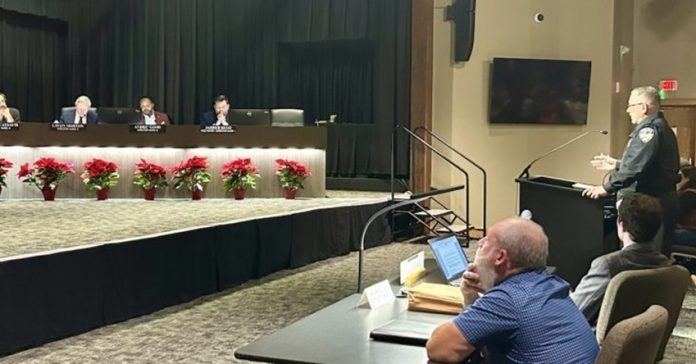Fort Smith, ARK — In a tense meeting on Tuesday evening, the Fort Smith Board of Directors voted against a proposed ordinance that would have prohibited people from sleeping on sidewalks, streets, and alleys, as well as camping on city property. The proposal was narrowly defeated with a 4-3 vote, after passionate public input and concerns raised by local advocates and experts.
The ordinance, presented by Shawn Gard, Director of Neighborhood Services, was designed to address the increasing visibility of homelessness in Fort Smith. It sought to clear public spaces by criminalizing the act of sleeping or camping outdoors in certain areas of the city. However, the proposal was met with strong opposition from both city leaders and community members who argued it would not solve the underlying issue of homelessness.
City Directors Jared Rego, Andre Good, George Catsavis, and Christina Catsavis voted against the measure, citing concerns about its impact on vulnerable populations. Directors Kevin Settle, Neal Martin, and Lavon Morton voted in favor, stressing the growing public dissatisfaction over the visibility of homelessness in the city.
During the meeting, residents filled the Blue Lion venue, offering passionate testimony against the ordinance. Many speakers expressed concerns that the proposed law would exacerbate the dehumanization of homeless individuals without offering any viable solutions. Samantha Holland, the Director of Case Management at Jessi’s House, a local shelter, argued that the ordinance would fail to address the systemic causes of homelessness, such as the lack of available shelter space and affordable housing. Holland pointed out that many shelters, including the Hope Campus, are often at capacity, especially during harsh weather conditions, leaving many individuals without a safe place to stay.
“There is a waitlist for HUD services, shelters are turning people away, and this ordinance does not offer an alternative for where these people are supposed to go,” Holland said. “Ordinances like this are not humane; they ignore the root causes of homelessness.”
Fort Smith Police Chief Danny Baker also weighed in on the matter, clarifying that homelessness itself is not illegal. Baker stated that while the ordinance may be constitutionally sound, it would not provide the long-term solutions that the city needs. He emphasized that law enforcement alone cannot address homelessness, and that comprehensive policies addressing mental health, substance abuse, and affordable housing are needed to make a real difference.
“Homelessness isn’t something that can be solved by police or legislation that targets the homeless. We need policies that focus on mental health and addiction,” Baker said.
Director Settle, who supported the ordinance, acknowledged that the issue of homelessness has become a growing concern for many residents. He noted that the board had received numerous complaints from the public, including teachers and parents, who expressed frustration with the visible presence of homeless individuals in public spaces.
“We hear from citizens all across the city—teachers, principals, and families—who want to see something done to improve the look and feel of our city. This is not just about aesthetics; it’s about creating a safer, cleaner environment for everyone,” Settle said.
While the ordinance was defeated, the discussion highlighted the deep divide within the community over how best to address homelessness. Advocates for the homeless argue that solutions should prioritize compassion and support, rather than punitive measures, while others call for stronger enforcement of public space usage to maintain the city’s cleanliness and order.
As the debate continues, city leaders are under increasing pressure to find sustainable, humane solutions to the homelessness crisis in Fort Smith. The decision to reject the ordinance may signal a shift toward more thoughtful discussions about addressing the root causes of homelessness—such as affordable housing, mental health services, and addiction treatment—rather than focusing on measures that criminalize the homeless population.

